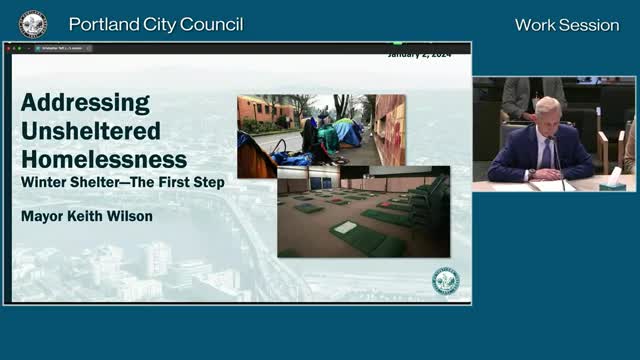Portland to open 200 overnight winter shelter beds in two locations starting Jan. 7
Get AI-powered insights, summaries, and transcripts
Subscribe
Summary
Mayor announced a county-city partnership providing 200 low-barrier overnight winter shelter beds starting Jan. 7, funded by a $375,000 Multnomah County contribution matched by the city; Salvation Army will operate sites with a 1:20 staff-to-guest ratio and outreach tied to 311/211 and county teams.
Mayor Ted Wilson and Portland Solutions Director Skyler Brecker Knapp announced that Portland will open 200 overnight winter shelter beds at two sites beginning Tuesday, Jan. 7, as part of an emergency push to reduce deaths and severe harms among people living unsheltered.
The partnership with Multnomah County and local providers will put the beds into operation immediately, with the county providing $375,000 and the city matching that amount, Skyler Brecker Knapp said. "We will be partnering with the Salvation Army," Knapp said, identifying the organization as the initial operator for the two sites.
City officials described the sites as low-barrier, life-saving emergency shelters intended to ensure that "every Portlander has a safe place to sleep every night." The sites will operate initially for 90 days and will remain part of the city and county continuum of shelter services beyond that timeframe, Knapp said. Officials said the two locations are being evaluated and that specific addresses were not specified during the briefing.
Knapp and the mayor said the shelters will be staffed to a 1:20 client-to-staff ratio. "We've worked with the Salvation Army to establish a 1 to 20 client, staff to client ratio," Knapp said, adding that the goal is higher staffing than some past severe-weather models and the county's prior 1:45 ratio. The Mayor and staff said county outreach workers and existing daytime service providers will be paired with the nighttime sites so guests can be referred into the broader system and into daytime services.
Council members asked about safety, affinity spaces and neighborhood impacts. Councillor Murillo pressed officials on protections for people who face heightened risks in congregate settings, including transgender and queer youth; the mayor and Knapp said the shelters are intended as emergency, life-saving capacity and that affinity-based or culturally specific providers can be part of the continuum if they come forward. "If somebody comes in and says, this is our group ... that's their mission, we will accept that," Knapp said, while cautioning that the current emphasis is rapid expansion to reduce deaths on the street.
Officials said the facilities will be low-barrier and allow pets, a point Mayor Wilson confirmed after Councillor Novick asked whether people could bring animals. "All are welcome. Including pets," Knapp said.
Outreach and access: Officials said outreach teams and 311 will be the primary access points for connecting people to the new beds, and that 211 remains the larger, citywide directory for shelter resources. Knapp said outreach workers will actively engage people in surrounding areas and that 311 will have information about hours and eligibility; a single phone reservation system was not in place on the sites' first day.
Severe-weather pivot and inventory: The sites can pivot to 24/7 severe-weather operations when necessary, the mayor said, and officials said they are coordinating to avoid a loss of severe-weather capacity elsewhere in the system. Knapp said the new sites are an addition to the existing inventory rather than a substitution: "This is an addition to what's already in our system," he said.
Funding and next steps: City and county officials said additional expansion will rely on a mix of city, county, state, nonprofit and philanthropic funding and private property offers; the mayor said local businesses have offered properties that are being evaluated for future shelter capacity. Blanche House, a separate provider, is planning a 75-bed women-only shelter in coming months, officials said.
Councilors also raised calls for a clear phone number or contact for neighbors to report livability concerns near sites; the mayor and staff said they are working to coordinate a neighborhood response that prioritizes nonpolice interventions, including Portland Street Response, outreach teams and public-safety partners.
Why it matters: City leaders framed the move as an urgent, immediate life-saving response after years of rising unsheltered homelessness and elevated deaths on the street. The mayor cited large increases in unsheltered counts since 2017 and described the effort as the first step in a larger expansion of shelter and daytime services.
What remains unspecified: Officials did not provide the exact addresses for the two Jan. 7 locations, the full staffing provider lists beyond Salvation Army, nor a permanent reservation phone line at the time of the announcement. Officials said they would announce more access details at an interagency outreach call the next morning and through 311 and partner outreach teams.
Ending: City leaders asked councilors for support as they expand capacity and said they will return with further details as sites are evaluated and funding is secured.
